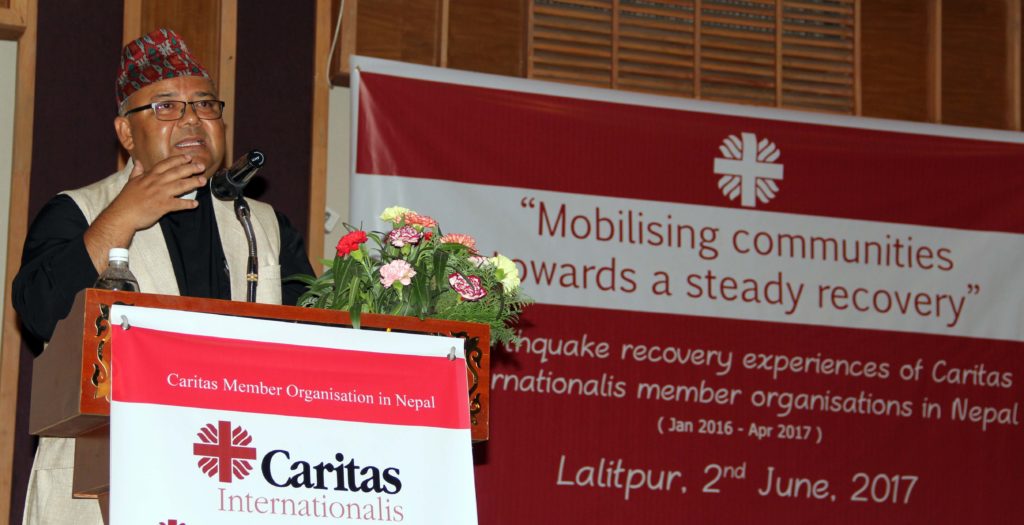NC Reporter
Kathmandu, 6 June, 2017
After the earthquake of April 2015 Caritas started working with local communities affected by the disaster, with the motto “mobilising communities towards a steady recovery”.
In close coordination with several international Caritas partners, Caritas Nepal has been conducting recovery programmes in 15 highly affected districts. Caritas is one of the NGOs who are most closely involved in the recovery programme.
On 2 June all our Caritas Internationalis member organisations (CIMOs) shared their earthquake recovery experiences at an event organised to commemorate the second anniversary of the Nepal earthquake. The event was attended by Chief Guest Bir Bahadur Thaguna, Treasurer of the Social Welfare Council (SWC), Dr. Bhisma Bhusal, Joint Secretary of the National Reconstruction Authority (NRA), and Bishop Paul Simick. All three joined in lighting the candle to open the event.

Fr Silas Bogati, Executive Director of Caritas Nepal, thanked CIMOs throughout the world who had committed themselves to labour for Nepal’s recovery. “Without their collaboration and assistance, this would not have been possible,” he declared, and handed out booklets describing the overall progress made by Caritas Nepal, Caritas Internationalis and CIMOs over the past two years.
His Excellency Bishop Paul Simick was happy to see how Caritas Nepal and CIMOs have prioritised the needs of the most vulnerable. On behalf of the executive body, he congratulated and complimented Caritas Nepal and its member organisations on their wonderful service during the earthquake reconstruction phase. He noted that their combined efforts had gradually shifted focus from immediate humanitarian assistance to long-term reconstruction.
He added, “The affected people of Nepal are gradually rebuilding their lives, reconstructing their homes, gaining better access to clean water and sanitation, receiving quality healthcare and generating incomes to support their families.”
The last two years have been a tough time for those who lost their homes and families. Caritas initiated a Cash for Work programme under its Livelihoods initiative, benefiting 3693 people who helped clear debris to allow construction of new houses, reconstruct seasonal roads and rebuild damaged irrigation canals, and in return received cash in hand to cover their daily household expenses.
Caritas has already conducted mason training sessions for 2448 masons, teaching them to construct earthquake-resilient houses using local resources like stone, wood, mud and iron rods.
Mr. Karki is an experienced mason who is currently working on reconstructing damaged houses in his village.
“I have been working as a labourer for 60 years, but it was only after the earthquake that I realised the importance of earthquake-resistant houses,” he said.
Mr Karki had constructed many houses before the earthquake, but they were not sustainably built and lasted only for 15-20 years. Thanks to the training he was able to supplement his experience with new ideas and methods for building earthquake-resistant houses.
“Caritas is making outstanding efforts to prevent further damage to our communities by encouraging us to build well-designed, disaster-proof houses,” he said.
Around 21,445 people are now able to access pure drinking water after Caritas constructed 63 drinking water systems. Several awareness programmes on hygiene and sanitation, including drama shows and training courses, have reached some 10,710 people and increased their knowledge about these issues, reducing the incidence of the catastrophic diseases that can strike communities following a disaster.
Dhanmaya Shrestha of Baseshwor Ward-3, Sindhuli thanked Caritas with a smiling face. “Caritas made our lives easy. We used to drink water from the Sunkoshi River, which was unhealthy and took a long time to fetch. Now we are happy that we don’t have to waste our time and energy on collecting water, as Caritas has constructed a well-managed tap stand right beside our house which is in service 24 hours a day.”





















Discussion about this post